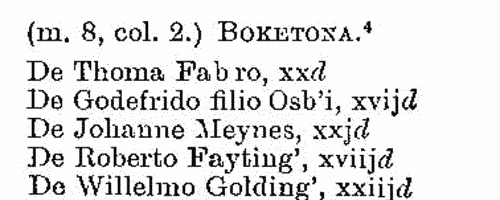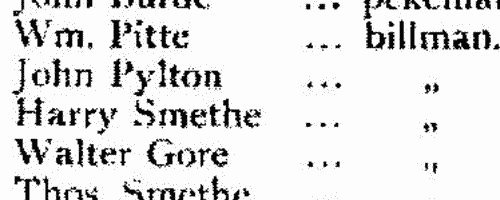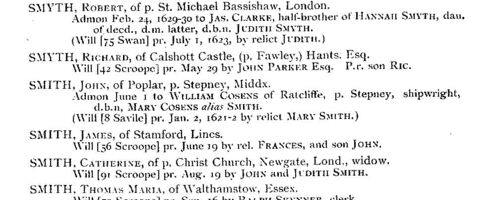Doble Surname Ancestry ResultsOur indexes 1000-1999 include entries for the spelling 'doble'. In the period you have requested, we have the following 125 records (displaying 1 to 10): Single Surname Subscription | | | Buying all 125 results of this search individually would cost £682.00. But you can have free access to all 125 records for a year, to view, to save and print, for £100. Save £582.00. More... |
These sample scans are from the original record. You will get scans of the full pages or articles where the surname you searched for has been found. Your web browser may prevent the sample windows from opening; in this case please change your browser settings to allow pop-up windows from this site. Inhabitants of Yorkshire
(1297)
Taxation roll of the lay (non-clergy) inhabitants of Yorkshire from the 25th year of the reign of king Edward I. LatinDOBLE. Cost: £6.00.  | Sample scan, click to enlarge

| Clergy, the religious and the faithful in Britain and Ireland
(1342-1362)
These are abstracts of the entries relating to Great Britain and Ireland from the Regesta of popes Clement VI and Innocent VI, from the period when the papal court was resident at Avignon. Many of these entries relate to clerical appointments and disputes, but there are also indults to devout laymen and women for portable altars, remission of sins, &c. This source is particularly valuable for Ireland, for which many of the key government records of this period are lost. Clement VI was consecrated and crowned 19 May 1342 (the day from which his pontificate is dated); Innocent VI was crowned 18 December 1352 and died 12 September 1362. The extracts were made by W. H. Bliss and C. Johnson from Regesta cxxxvii to ccxliv, and published in 1897. The registers are almost complete for these two pontificates. At his accession, Clement VI promised to grant benefices to all poor clerks who should come to Avignon and claim them within two months of his coronation. As many as 100,000 are said to have come, and the register for the first year of his pontificate runs to twelve volumes.DOBLE. Cost: £4.00.  | Sample scan, click to enlarge

| Somerset testators and legatees
(1501-1530)
Somerset was almost coextensive with the diocese of Bath and Wells, which exercised local probate jurisdiction through its consistory and archdeaconry courts: but superior to the diocese was the province of Canterbury. Somerset testators who also had property outside the county had their wills proved in the Prerogative Court of Canterbury (PCC). The Somerset Record Society embarked on a program of publishing genealogical abstracts of the registered copy wills of Somerset testators in the PCC archives, and in 1903 (volume xvi) printed abstracts edited by the Reverend F. W. Weaver from the PCC registers 1501-1503 (register Blamyr), 1504-1506 (Holgrave), 1506-1508 (Adeane), 1508-1511 (Bennett), 1511-1514 (Fetiplace), 1514-1517 (Holder), 1517-1520 (Ayloffe), 1520-1522 (Maynwaryng), 1523-1525 (Bodfelde), 1525-1528 (Porch) and 1529-1530 (Jankyn). In addition, the volume includes abstracts of 48 Somerset copy wills in the registers of the Archbishops of Canterbury at Lambeth Palace Library from 1363 to 1491. The heading of each abstract gives the year of making the will (not the year of probate) and the testator's name in bold. Below that is the quire number and name of the PCC register. Date and details of probate are given at the foot of each abstract. Spellings of surnames are preserved as they appear in the registered copy wills, and may vary within a single document.DOBLE. Cost: £4.00.  | Sample scan, click to enlarge

| Tenants of Somerset chantries
(1548)
Chantries were established to perform services for the souls of their founders and other faithful dead, including annual obits and anniversaries at which alms were usually distributed. The chantries could be at an existing altar in a parish church, a new altar in a side chapel of an existing church, in a new chapel in the churchyard or some miles from an existing church: few were founded before 1300, and most date from 1450 to 1500. Hospitals were places provided by similar foundations to receive the poor and weak; there were also religious guilds, brotherhoods and fraternities, and colleges (like large chantries at which three or more secular priests lived in common). An Act of Parliament of 1545 gave king Henry VIII the power to dissolve such chantries, chapels, &c., the proceeds to be devoted to the expenses of the wars in France and Scotland. Commissioners were appointed 14 February 1546 to survey the chantries and seize their property, and in 1548 the commissioners in Somerset produced this survey and rental. The individuals named are the tenants whose rents provided the chantry's income: occasionally an incumbent is named. The survey was edited by Emanuel Green for the Somerset Record Society, and published in 1888.DOBLE. Cost: £4.00.  | Sample scan, click to enlarge

| Freemen of London
(1540-1550)
The long series of mediaeval registers and books of admission of the freemen of London was destroyed by fire in 1786. Thirty surviving charred leaves were gathered together and rebound, becoming Egerton MS 2408 in the British Museum. The order is jumbled and generally speaking none can be dated with certainty, although all belong to the very end of the reign of Henry VIII and the start of the reign of his son, Edward VI. These are pages from the admission books. Each entry here usually gives the name of the person admitted to the freedom; his father's name, address and occupation; his entitlement to the freedom, usually by having served out an apprenticeship to a citizen, naming the master and his trade. Then there may follow a cross-reference to M. or N., being two volumes of another set of official books denoted by the letters of the alphabet, and following each other in chronological sequence, which evidently gave details of entries into apprenticeships. These other books no longer exist: but the dates given for entry do identify the start of the apprenticeship, and so give by implication a date for the eventual admission to freedom. In the margin is the name of the city ward and the total of the fee and fine paid on admission.DOBLE. Cost: £4.00.  | Sample scan, click to enlarge

| Inhabitants of Suffolk
(1568)
By Act of Parliament of December 1566 a subsidy of 8d in the £ on moveable goods and 4s in the £ on the annual value of land was raised from the lay (as opposed to clergy) population. These are the returns for Suffolk, printed in 1909 in the Suffolk Green Book series.DOBLE. Cost: £4.00.  | Sample scan, click to enlarge

| Militia in Williton hundred, Somerset
(1569)
A muster of the ablemen, gunners, light horsemen, pikemen, archers and billmen available from this hundred, compiled by sir Hugh Paulet, sir Maurice Barkeley, sir Ralph Hopton and John Horner in answer to a royal commission of the 11th year of queen Elizabeth. The returns are arranged by tithing. The hundred consisted of the parishes of Bicknoller, Brompton Ralph, Brompton Regis, Brushford, Chipstable, Clatworthy, Crowcombe, Dodington, (the market town of) Dulverton, East Quantoxhead, Elworthy, Exton, Halse, Hawkridge, Huish Champflower, Kilton, Kilve, Lilstock, Monksilver, Nether Stowey, Nettlecombe, Old Cleeve, Raddington, St Decumans (Watchet), Sampford Brett, Skilgate, Stogumber, Upton, West Quantoxhead, Winsford and Withypool. (The sample shown is from the return for the borough of Axbridge)DOBLE. Cost: £6.00.  | Sample scan, click to enlarge

| Official Papers
(1627-1628)
The State Papers Domestic cover all manner of business relating to Britain, Ireland and the colonies, conducted in the office of the Secretary of State as well as other miscellaneous records.
DOBLE. Cost: £4.00.  | Sample scan, click to enlarge

| PCC Probates and Administrations
(1631)
The Prerogative Court of Canterbury's main jurisdiction was central and southern England and Wales, as well as over sailors &c dying abroad: these brief abstracts, compiled under the title "Year Books of Probates", and printed in 1902, usually give address, date of probate and name of executor or administrator. They are based on the Probate Act Books, cross-checked with the original wills, from which additional details are, occasionally, added. The original spelling of surnames was retained, but christian and place names have been modernised where necessary.DOBLE. Cost: £2.00.  | Sample scan, click to enlarge

| PCC Probate Abstracts
(1630-1634)
The Prerogative Court of Canterbury's main jurisdiction was central and southern England and Wales, as well as over sailors &c dying abroad: these brief abstracts usually give address, date of probate and name of executor or administrator
DOBLE. Cost: £2.00.  | Sample scan, click to enlarge

|
Research your ancestry, family history, genealogy and one-name study by direct access to original records and archives indexed by surname.
|












